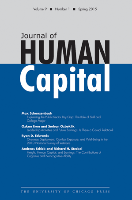
Journal of Human Capital
Scope & Guideline
Advancing the understanding of human potential in the economy.
Introduction
Aims and Scopes
- Human Capital Measurement and Assessment:
The journal emphasizes the measurement and assessment of human capital, including cognitive and noncognitive skills, learning disabilities, and educational attainment. It seeks to understand how these factors impact labor market outcomes and societal well-being. - Socioeconomic Disparities and Education:
A core focus is on the interplay between socioeconomic factors and educational access and attainment, particularly how gender, race, and migration status affect educational opportunities and outcomes. - Intergenerational Transmission of Human Capital:
The journal explores how human capital is transmitted across generations, examining parental influences, maternal health, and early childhood education's role in shaping future educational and economic outcomes. - Policy Interventions and Their Effects:
Research published often investigates the effects of various educational and health policy interventions, including randomized controlled trials and program evaluations, to assess their impact on human capital development. - Labor Market Dynamics and Human Capital:
The journal also examines the relationship between human capital accumulation and labor market dynamics, including wage effects, job market responses, and the role of education in entrepreneurship.
Trending and Emerging
- Impact of Early Childhood Interventions:
There is an increasing emphasis on the importance of early childhood education and interventions, particularly regarding their long-term benefits on cognitive and emotional development, as evidenced by numerous studies exploring randomized controlled trials. - Influence of Migration on Human Capital:
Research focusing on the effects of migration on human capital accumulation, particularly in the context of refugee populations and their impact on host countries, has gained prominence, addressing urgent global socio-economic challenges. - Noncognitive Skills and Educational Outcomes:
The exploration of noncognitive skills—such as resilience, motivation, and social skills—and their impact on educational and labor market outcomes is becoming a focal point, emphasizing the need for comprehensive skill development. - Health and Human Capital Interconnections:
There is a growing trend to investigate the links between health and human capital, particularly how maternal health and early health investments influence educational and economic outcomes in children, reflecting a holistic view of human capital. - Behavioral Economics in Education:
The application of behavioral economics to educational policy and practice is emerging as a significant theme, with studies assessing how incentives and behavioral responses affect educational outcomes and teacher performance.
Declining or Waning
- Traditional Gender Studies in Education:
Research specifically addressing gender disparities in education has seen a decline, with fewer papers focusing solely on gender as a standalone factor in educational outcomes, as the discourse has shifted towards intersectionality and broader socio-economic contexts. - Longitudinal Studies on Fixed Education Models:
There appears to be less emphasis on longitudinal studies that analyze fixed models of education, as recent publications favor more dynamic approaches to understanding human capital development through innovative interventions and real-time data. - Economic Models of Human Capital Without Contextual Factors:
There is a noticeable reduction in purely economic models of human capital that do not integrate contextual factors such as health, immigration, or socio-economic status, signaling a shift towards more holistic and interdisciplinary approaches.
Similar Journals
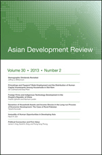
Asian Development Review
Empowering Change through Open Access ScholarshipThe Asian Development Review, published by World Scientific Publishing Co Pte Ltd, is a distinguished journal that has been at the forefront of scholarly discourse in the fields of development, economics, and geography since its inception in 1987. With an Open Access model adopted in 2013, this journal strives to enhance the accessibility of high-quality research, facilitating a broader dissemination of vital knowledge and insights that address pressing socio-economic challenges across the Asian landscape. The journal is classified in the Q2 Quartile category for 2023 in Development, Economics and Econometrics, as well as Geography, Planning, and Development, reflecting its substantial contribution to these fields. The journal also holds respectable rankings in Scopus, placing it in the top 45-55th percentile across various disciplines. Researchers, professionals, and students are encouraged to explore the wealth of research and methodologies presented in this impactful publication, which not only seeks to illuminate current issues but also aims to inform policy and practice across the Asian region.

INTERNATIONAL JOURNAL OF EARLY CHILDHOOD
Pioneering research in developmental psychology and education.INTERNATIONAL JOURNAL OF EARLY CHILDHOOD, published by Springer, is a prestigious platform dedicated to the exploration and advancement of knowledge in the fields of Developmental and Educational Psychology as well as Education. With an ISSN of 0020-7187 and E-ISSN 1878-4658, this journal plays a pivotal role in disseminating research findings and theoretical developments related to early childhood education worldwide. Its impact is underscored by its noteworthy rankings, placing it in the Q2 category for Developmental and Educational Psychology and Q1 in Education in 2023, reflecting its significance in the scholarly community. With a robust Scopus rank of #186 out of 1543 in Social Sciences Education and #68 of 360 in Developmental and Educational Psychology, this journal ensures high visibility and engagement for innovative research. Since its inception in 1969, the journal has served as a vital resource for researchers, educators, and policy-makers interested in shaping the future of education through empirical evidence and comprehensive studies.
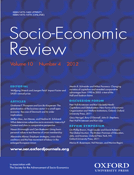
Socio-Economic Review
Exploring the Nexus of Society and EconomySocio-Economic Review is a prestigious academic journal published by Oxford University Press, focusing on the critical interplay between economic and socio-political factors. With an ISSN of 1475-1461 and E-ISSN of 1475-147X, this journal has consistently maintained a high standard of research output since its inception in 2005. Recognized in the top quartile (Q1) for both Economics, Econometrics and Finance and Sociology and Political Science, it ranks impressively within the upper echelons of its fields, placing 18th out of 288 in Economics and 91st out of 1466 in Social Sciences according to Scopus data. The journal aims to provide a platform for innovative and interdisciplinary research that addresses pressing socioeconomic issues across the globe. Although it is not currently an Open Access journal, its commitment to quality and relevance ensures its impact in shaping discourse among researchers, professionals, and students alike. With its publication based in the United Kingdom, the Socio-Economic Review serves as a vital resource for advancing knowledge and understanding in the social and economic sciences.
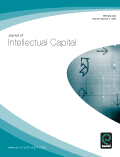
Journal of Intellectual Capital
Navigating the Complexities of Intellectual Capital in Today's EconomyThe Journal of Intellectual Capital, published by Emerald Group Publishing Ltd, stands as a premier academic platform in the fields of business, management, accounting, and education. With an impressive 2023 Impact Factor placing it in the Q1 quartile for both Business and Education categories, this journal has earned notable recognition, ranking #19 out of 1543 in Social Sciences Education and #6 out of 218 in General Business Management and Accounting. Since its inception in 2000, the journal has continuously focused on the nuanced study of intellectual capital and its implications in various sectors, making invaluable contributions to both academia and industry practices. While it is not an open-access journal, it provides a wealth of peer-reviewed articles that cater to researchers, practitioners, and students looking to deepen their understanding of intellectual assets and their management. With a commitment to fostering innovative theoretical and practical discussions, this journal is essential for anyone seeking to engage with the pivotal issues shaping the future of knowledge and capital in organizations.

JOURNAL OF HUMAN RESOURCES
Bridging theory and practice in human resources.JOURNAL OF HUMAN RESOURCES, published by the University of Wisconsin Press, stands as a premier platform for the dissemination of cutting-edge research in the domains of economics, management, and organizational behavior. With an esteemed Impact Factor and ranking in the Q1 category across multiple disciplines, including Economics and Econometrics and Human Resource Management, this journal serves as a critical resource for academics, practitioners, and students alike, delving into vital issues and innovations in workforce management and organizational effectiveness. Since its inception in 1976, the journal has consistently provided invaluable insights that bridge theory and practice, thereby advancing the understanding of human resources within a global context. While the journal operates under a subscription model, it embraces a robust archiving strategy to ensure that its contributions are accessible and enduring. For those engaging with the Journal of Human Resources, it offers a rich tapestry of research that informs best practices and strategic developments, making it an essential read for anyone interested in the evolving landscape of human resources and organizational management.
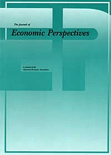
JOURNAL OF ECONOMIC PERSPECTIVES
Advancing Understanding through Rigorous Economic ResearchJOURNAL OF ECONOMIC PERSPECTIVES, published by the American Economic Association, is a leading academic journal that serves as a vital resource for researchers, professionals, and students in the fields of economics and econometrics. With an impressive impact factor, it ranks in the top Q1 quartile according to the 2023 statistics, demonstrating its significant influence and contribution to the discipline, particularly with a notable Scopus Rank of #21 out of 716 in the category of Economics and Econometrics. Spanning from 1992 to 2024, the journal provides a platform for rigorous and comprehensive analyses that illuminate contemporary economic issues and perspectives. While it does not currently offer open access options, its thorough and insightful content ensures it remains a respected and essential part of economic literature, addressing a diverse array of topics that resonate with the academic community.
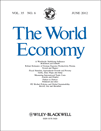
WORLD ECONOMY
Pioneering research at the forefront of economic thought.WORLD ECONOMY is a premier academic journal published by Wiley, renowned for its rigorous peer-reviewed research in the fields of economics, finance, accounting, and political science. Established in 1977, the journal has consistently contributed to the advancement of knowledge, reflected in its strong standing across various category quartiles, notably achieving Q1 in Accounting and Political Science, and ranking in the top quartile in its respective disciplines as of 2023. With an audience that spans researchers, professionals, and students, WORLD ECONOMY publishes impactful articles that explore critical issues affecting the global economy. Although it is not an open-access publication, readers have access options to engage with cutting-edge research that addresses both theoretical and practical aspects of world economic trends. The journal's commitment to excellence is further underscored by its impressive Scopus rankings, situating it among the top journals in the social sciences arena. For anyone keen on deepening their understanding of the dynamics shaping our economic landscape, WORLD ECONOMY remains an indispensable resource.
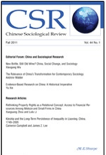
Chinese Sociological Review
Innovating Research on Critical Social PhenomenaChinese Sociological Review, published by Routledge Journals, Taylor & Francis Ltd, stands as a leading platform for scholarly discourse in the field of sociology, providing critical insights into China's social dynamics and beyond. With an impressive impact factor reflected in its Q1 quartile rankings across multiple categories, including Anthropology, Demography, Gender Studies, and Sociology and Political Science, the journal's rigorous peer-reviewed content consistently ranks among the top sources for academic research—evidenced by its Scopus rankings that place it in the 98th and 96th percentiles across key areas. Established to foster a deeper understanding of sociopolitical phenomena, the journal invites researchers, practitioners, and students to engage with contemporary sociological issues through an open-access model, ensuring widespread dissemination of knowledge. As it continues to evolve through its converged years (2011-2024), the Chinese Sociological Review remains an indispensable resource for those seeking to advance their understanding of sociological theories and practices within a global context.

Journal of Southeast Asian Economies
Advancing Insights into Southeast Asian EconomiesThe Journal of Southeast Asian Economies, published by the Institute of Southeast Asian Studies (ISEAS)2339-5095 and an E-ISSN of 2339-5206, this journal contributes significantly to the fields of Economics, Finance, Political Science, and International Relations, holding esteemed quartile rankings including Q2 in Political Science and International Relations and Q3 in both Economics and Econometrics and Finance as of 2023. Nestled in Singapore, the journal encompasses a wide array of topics pertinent to the region's economies and societies, thereby aiding policymakers, researchers, and academics in understanding the economic landscape of Southeast Asia. The journal’s rigorous peer-review process and commitment to advancing scholarship make it an essential resource for those interested in economic analysis and development strategies, ensuring accessibility to valuable research. Join the growing community of scholars committed to contributing to the economic discourse in and about Southeast Asia, enhancing understanding and paving the way for future innovations.
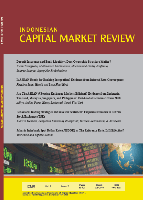
Indonesian Capital Market Review
Advancing Knowledge in Indonesian Financial MarketsIndonesian Capital Market Review is a prominent academic journal dedicated to the exploration of financial markets, investment strategies, and economic policies within Indonesia and Southeast Asia. Published by Universitas Indonesia, this journal has been an essential resource for researchers, professionals, and students since its inception in 2009, offering open access to its content to promote wider dissemination of knowledge. With an ISSN of 1979-8997 and an E-ISSN of 2356-3818, it aims to bridge the gap between theoretical frameworks and practical applications in the capital markets. By rigorously vetting its publications, the journal enhances the academic discourse surrounding financial systems, thereby empowering stakeholders with empirical insights. The commitment to open access ensures that groundbreaking research is readily available to a global audience, advancing the understanding of capital market dynamics in Indonesia and beyond.